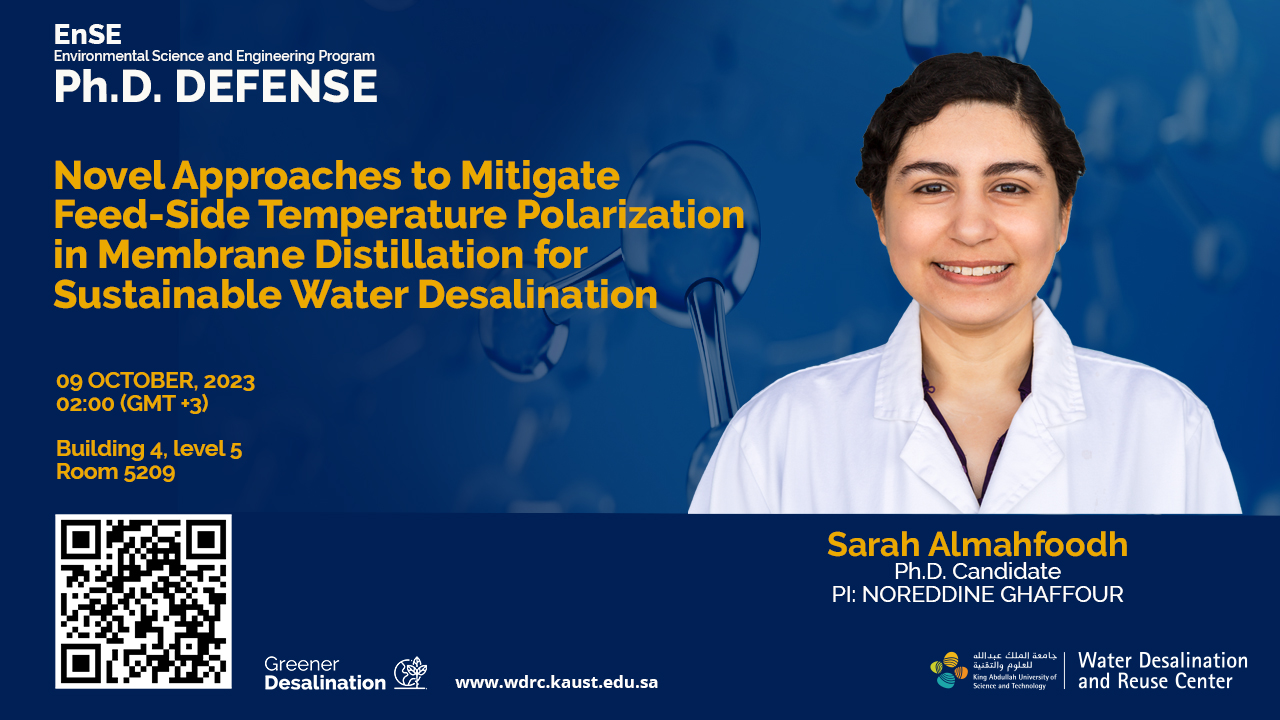



Abstract:
Water scarcity, exacerbated by climate change, population growth, urbanization, and industrialization, poses significant challenges worldwide. Desalination technologies have emerged as vital solutions for augmenting freshwater supplies by extracting fresh water from saline brackish, sea, and ocean waters. Nevertheless, there is still a need for advancing desalination technologies to enhance freshwater recovery from desalination brine while enabling mineral and salt recovery. Among the promising technologies is membrane distillation (MD), which offers unique advantages for desalinating and concentrating brines. Nevertheless, several challenges hinder the scale-up and commercialization of MD, with temperature polarization (TP), a natural occurrence, being the most impactful challenge.
This dissertation is focused on novel methods to mitigate TP on the feed side of MD by considering process, membrane, and module modifications. Firstly, on the process side, a sprayed-feed configuration is introduced to enhance the evaporation surface area while minimizing contact with the membrane. Experimental investigations under various operating conditions showcase the effects of these modifications on flux production and thermal energy efficiency. Secondly, on the membrane side, photothermal membranes composed of chemically modified graphene oxide (GO) are developed to achieve superhydrophobic properties. These membranes are evaluated within a solar steam generation apparatus utilizing real Red Sea water and brine discharge from desalination plants. The performance and potential applications of the photothermal membranes in terms of efficient steam generation and salt recovery are thoroughly examined.
Finally, the module design, which plays a crucial role in MD performance, is addressed. Computational studies employing computational fluid dynamic (CFD) and machine learning models are conducted to explore the impact of hydrodynamic, thermal, and geometric parameters on the conventional straight hollow fiber (HF) module. The findings highlight the limitations of conventional HF modules in MD. Consequently, a novel coiled hollow fiber (CHF) module design, coupled with a heating element, is proposed and investigated computationally and experimentally. The performance of the CHF module is assessed under different operation modes, and the influence of these modes on flux and energy efficiency is thoroughly discussed.
Through a comprehensive investigation and analysis of process, membrane, and module modifications, this research seeks to provide insights into mitigating TP, enhancing MD performance, and surmounting the obstacles which prevent the commercialization of MD.
About the speaker:
Sarah holds a Bachelor of Science degree in Chemical Engineering from the Colorado School of Mines. She began her professional career at the Saudi Aramco Research and Development Center, where she contributed to the development of membranes and membrane processes for gas separation.
In 2019, Sarah completed her Master of Science in Chemical Engineering from Delft University of Technology. Following her master's degree, she joined the King Abdullah University of Science and Technology (KAUST) as a Ph.D. candidate in Chemical Engineering, where her research is primarily focused on addressing temperature polarization on the feed side of membrane distillation.
During her time at KAUST, Sarah participated in the Brains for Brine challenge at Aquatech, where she secured first place, and the KAUST Falling Walls Labs competition in 2022, finishing in third place. Sarah has actively participated in events organized by the Water Desalination and Reuse Center (WDRC), including Water Day, KAUST Open Research Week, and the UN game changer challenge.